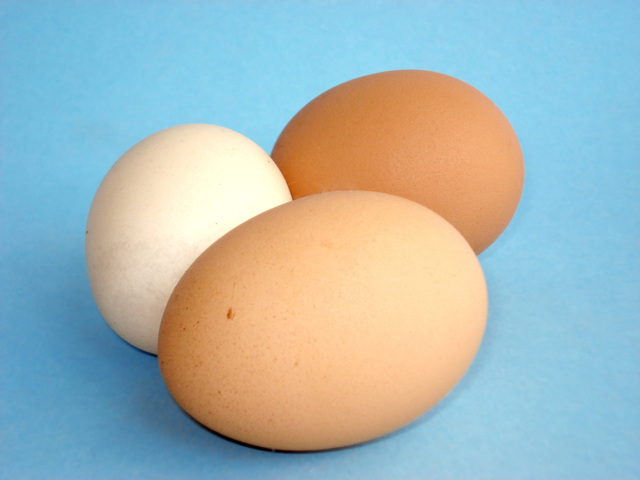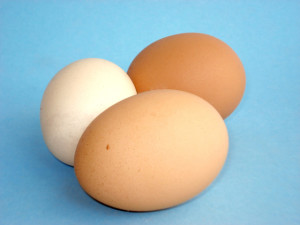
SICKLE CELL AND EGGS
Both the white and yolk of an egg are rich in nutrients – proteins, vitamins and minerals with the yolk also containing cholesterol, fat soluble vitamins and essential fatty acids. Eggs are an important and versatile ingredient for cooking, as their particular chemical make up is literally the glue of many important baking reactions.
Nutritional highlights
Eggs are a very good source of inexpensive, high quality protein. More than half the protein of an egg is found in the egg white along with vitamin B2 and lower amounts of fat and cholesterol than the yolk. The whites are rich sources of selenium, vitamin D, B6, B12 and minerals such as zinc, iron and copper. Egg yolks contain more calories and fat. They are the source of cholesterol, fat soluble vitamins A, D, E and K and lecithin – the compound that enables emulsification in recipes such as hollandaise or mayonnaise.
Some brands of egg now contain omega-3 fatty acids, depending on what the chickens have been fed (always check the box). Eggs are regarded a ‘complete’ source of protein as they contain all eight essential amino acids; the ones we cannot synthesise in our bodies and must obtain from our diet.
Eggs also contain more Vitamin D than they did 10 years ago, which helps to protect bones, preventing osteoporosis and rickets. And they are filling too. Eggs for breakfast could help with weight loss as the high protein content makes us feel fuller for longer. Eggs should be included as part of a varied and balanced diet.
Quail eggs…
Quail eggs have a similar flavour to chicken eggs, but their petite size (five quail eggs are usually equal to one large chicken egg) and pretty, speckled shell have made them popular in gourmet cooking. The shells range in colour from dark brown to blue or white. Quail eggs are often hard-boiled and served with sea salt.
Duck eggs…
Duck eggs look like chicken eggs but are larger. As with chicken eggs, they are sold in sizes ranging from small to large. Duck eggs have more protein and are richer than chicken eggs, but they also have a higher fat content and more cholesterol. When boiled, the white turns bluish and the yolk turns red-orange.
http://www.bbcgoodfood.com
1. Eggs help to improve performance
Eggs have a high satiety index, meaning they make you feel full for longer. One large egg supplies 6g of high quality protein and a large variety of essential nutrients, with the exception of vitamin C. This is why teaming up a fruit or orange juice with an egg and whole-wheat/low GI bread provides the perfect breakfast to perform well in a challenging environment.
2. Eggs can help to iron out problems
Many people with mild iron deficiency experience vague symptoms of tiredness, headaches and irritability. Iron is the carrier of oxygen in the blood and plays an important role in immunity, energy metabolism and many other functions in the body. The iron in egg yolk is in the form of heme iron, the most readily absorbable and usable form of iron in food and more absorbable than the form of iron in most supplements.
3. Eggs improve nutrient adequacy of the diet
The nutrient density of eggs makes them a valuable contributor to a nutritious diet. A study among egg vs. non-egg consumers revealed that the diets of the non-egg consumers were more likely to fall short of vitamins A, E and B12. Eggs contributed 10-20% of folate and 20-30% of vitamins A, E and B12 among egg consumers. This study demonstrates the important role one food can play in ensuring nutrient adequacy.
4. Eggs help to promote brain health
Choline is a nutrient that facilitates brain development in the foetus and newborn as well as memory function even into old age. Eggs are an excellent dietary source of choline, and one egg per day will provide 28% of a pregnant woman’s choline requirement.
5. Eggs help to prevent cataracts and to protect eye sight
A good dietary intake of eggs, spinach and broccoli is associated with a significant decrease in cataracts (up to a 20% decrease) and age-related lens and retinal degeneration, the leading cause of blindness in the elderly (up to a 40% decrease).
Eggs are a good source of the antioxidants lutein and zeaxanthine, which play an important role in keeping the eyes healthy. It accumulates in the eye where these nutrients protect against some types of harmful, high-energy wavelengths of light. Getting enough lutein and zeaxanthine is therefore very important from childhood onwards throughout the life cycle.
6. Eggs provide the best quality protein
Protein is one of the most important elements of our diet. Our bodies use protein to build new and repair old tissue. Eggs are champions at providing high quality protein. Amino acids are the building blocks of protein. Nine of these amino acids cannot be manufactured by the body and must be derived from the diet. A complete protein food contains enough of these nine essential amino acids to promote growth and maintain body tissue.
Egg, milk and meat (including poultry and fish) proteins are all complete proteins, but egg protein is of the highest quality, with a rating of 100. Compared to eggs, milk is rated at 93 and fish and beef at 75. One egg has approximately the same protein content as 30g cooked meat, fish or poultry. And apart from being the most versatile and best source of protein in our diet, it is also the least expensive.
7. Eggs can help to protect our bones
Eggs are one of the few natural food sources of vitamin D, our sunshine vitamin. Vitamin D is essential for calcium absorption and for maintaining optimum bone health. Eggs therefore play a supporting role in the prevention of osteoporosis together with dairy products, our main source of calcium.
8. Eggs promote healthy hair and nails
The hair and nails reflect many biochemical imbalances and shortages in the body. Eggs can help to promote healthy hair and nails because of their high content of sulphur-containing amino acids and the wide array of vitamins and minerals.
Many people report faster growing hair after adding eggs to their diet, especially if they were previously deficient in foods containing zinc, sulphur, vitamin B12 and vitamin A.
(Madeleine de Villiers, Registered Dietician) http://www.health24.com







